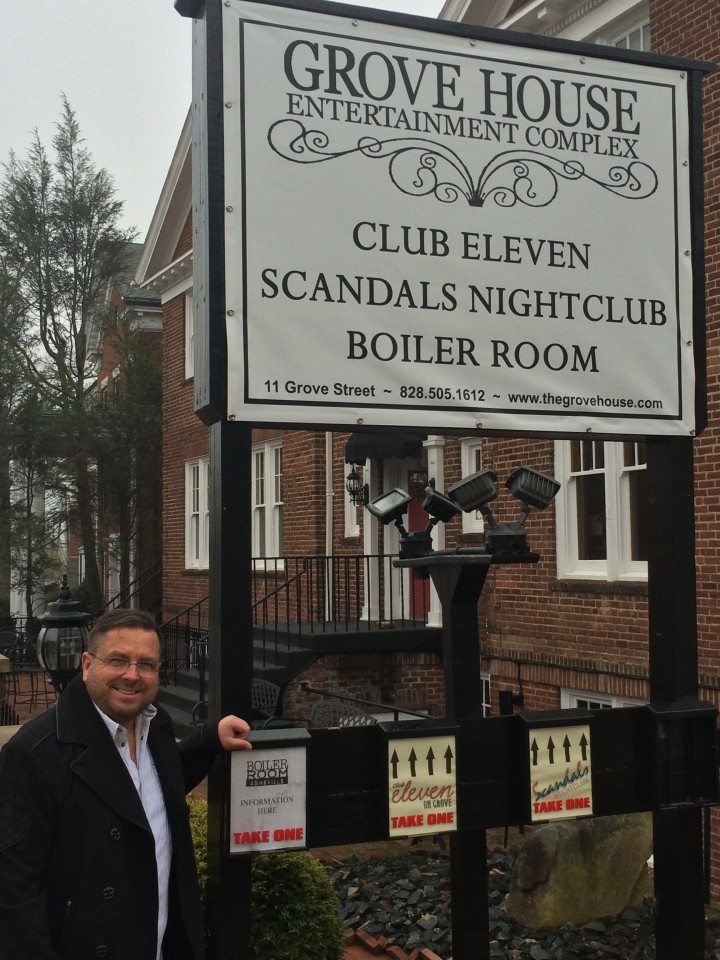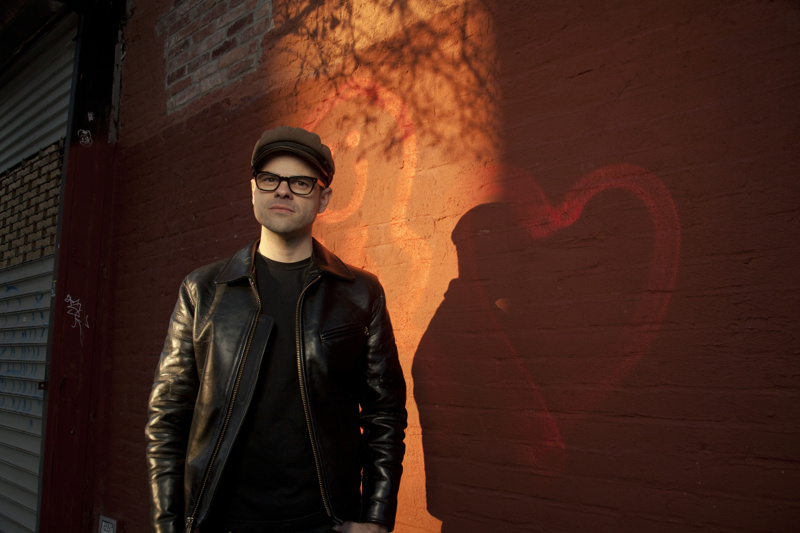It’s no secret that the Christian and LGBTQ communities have often found themselves at odds — each a thorn in the other’s side. And like many others, Asheville resident Tom Cash has experienced crisis and hopelessness as a member of both those communities, feeling that he had to choose one or the other.
“As far as my faith is concerned, I had every reason to abandon it years ago after enduring rejection from churches for being gay,” says Cash. “ I even endured four years of 24/7 reparative therapy, which was brutal.” Used by certain Christian organizations, the controversial process aims to change people’s sexual orientation. After that, he continues, “I left the ‘church system’ and went into years of self-destructive behaviors.”
Eventually, Cash found an LGBTQ church in Long Beach, Calif., where he was living with his husband. There he learned about the cultural context and etymology of the biblical references to homosexuality, and, able to interpret them in a new way, “I discovered that I had a destiny and a future as a gay Christian,” he says.
Now the lead pastor at the Jesus People Church of Asheville, Cash is also the founder of the Out to the Nations Transformation Conference. The third annual event will happen Friday through Sunday, April 17-19, at The Hub in West Asheville.
Given the limited attention actually paid to homosexuality in the Bible, Cash believes that the heated controversy the subject often inspires stems primarily from fear and ignorance.
“I believe that the Bible is the inspired word of God,” says Cash. “But it must be read and revealed in context — the culture of the time must be taken into account, and you must look up the original Greek and Hebrew meaning of key passages. God,” he points out, “calls his followers to strive not to be ignorant.”
Digging deep
Out to the Nations reaches out to LGBTQ people in the Southeast who’ve felt ostracized or hurt by the church, offering them Gospel-inspired uplift, a chance to connect with others, and the possibility of finding a new path and personal connection with God.
But the conference, like Cash’s church, is for straight folks as well, he emphasizes. It’s about creating common ground and common experience, and Cash hopes that both sides will dig deep within the roots of their faith to embrace their “brothers and sisters,” despite their respective fears and resentments.

This year’s conference will kick off with a Friday night speech by LGBTQ rights advocate Jay Bakker. The author of three books and pastor of the Minneapolis-based Revolution Church, Bakker is known for preaching inclusiveness, for his unconventional tattooed and semipunk style, and for a radical theology that many mainline and evangelical Christians find hard to swallow.
To Boot, Bakker is the youngest son of televangelists Jim and Tammy Faye Bakker, founders and hosts of “The PTL Club,” a hugely popular Charlotte-based TV show that collapsed in the wake of a 1987 scandal. The following year, Jim Bakker was convicted of fraud and conspiracy and served time in federal prison.
The collapse of his parents’ ministry triggered the first of many spiritual transformations for Jay, all of which have involved intensive study aimed at elucidating the Bible’s historical/linguistic context. And that quest, he says, has required him to regularly relinquish bits and pieces of his established views in order to move forward and be filled with the “good news” (i.e., the Gospel).
Again and again, Bakker explains, it’s meant giving up on certainty and finding himself in uncharted spiritual waters — which is what he believes all Christians are called to do.
“When you preach grace and talk about it so much, you start to realize that doubt is an element of faith, not the opposite of faith, and none of us can be certain,” says Bakker. “Certainty is an addiction for so many people. A lot of these arguments that I’ve had, especially around [the topic of] Indiana, have been with older Christians who had just been taught a particular black-and-white way of thinking. And I believe they’re scared, because if this isn’t right, then maybe their whole faith isn’t right. Maybe they’ve made mistakes about other things.”
Taking the plunge
Bakker didn’t officially “come out” as an LGBTQ ally until 2001. “There was something inside of me that said, ‘You can’t be silent on this anymore,’” Bakker explains. “Martin Luther King said, ‘It’s not the words of our enemies that we will remember but the silence of our friends.’”
At the time, his Revolution Church was based in Atlanta. Within 48 hours of announcing his pro-gay stance, Bakker saw all of his speaking engagements canceled, and a board member persuaded the church’s biggest donor to pull his funding.
That kind of reaction is not uncommon, notes Cash. “It’s hard for both sides. I know of straight church pastors who want to accept LGBT people, but they would be financially devastated if they became inclusive.”
Simultaneously advocating Christ’s message and equality for LGBTQ folks puts Jay Bakker in a strange position: often shunned by mainstream Christians while being mocked as brainwashed by the atheists with whom he culturally has more in common.
“It’s a weird world to be in,” says Bakker, who, like Cash, tries to straddle the frontiers of many different socio-cultural camps in the name of grace and inclusivity. But it’s tough, explains Bakker, because so many folks define themselves based on exclusivity, on who isn’t part of their tribe.
“I often find I have more in common with comedians than I do listening to other preachers,” he reports, “because I find this great honesty and truth in comedians that pastors are afraid to tell. … And unfortunately, the ones who aren’t afraid to tell the truth think the truth is that God hates you and wants to burn you for eternity.”
The philosophy behind Indiana’s controversial Religious Freedom Restoration Act, says Bakker, drives him “a little nuts,” because he sees the recent legislation as antithetical to what Christianity actually teaches.
“The Bible says if a soldier asks you to take his pack — and they’re talking about Roman soldiers who are occupying the territory, here — you carry it an extra mile,” Bakker explains. “If you get slapped, turn the other cheek. If they ask for your jacket, give them your shirt.” Chuckling to himself, he continues, “But then Christians get to this point where they’re like, ‘But baking a cake? Now that’s TOO FAR. Taking wedding photos? Wait a second. … I can’t do that — it’s wrong. Jesus wasn’t saying that carrying the soldier’s pack meant you were supporting the Roman government—you’re just showing grace and love.”
Finding grace
Contemporary society, says Bakker, is “post-Christian”; those leaving the church are often put off by its black-and-white perspective, while many who stay are trying to hold onto something familiar and certain.
Despite preaching ideas that seem radical to many, however, Bakker says he doesn’t blame folks who want that kind of certainty — he simply asks that they not force their convictions on others.
“Christianity is always supposed to be a revolution that transforms people,” he declares. And though the Out to the Nations conference, and others like it, tend to attract folks who’ve already taken a stand for equal rights, Bakker doesn’t feel he’s merely preaching to the choir. Even if everyone in attendance can agree on the equality part, there is ample opportunity for each individual to think more deeply about their own beliefs and certainties, and maybe take a step into that uncharted territory where, Bakker is convinced, you find grace and God.
The Out to the Nations Transformation Conference will happen Friday through Sunday, April 17-19, at The Hub in West Asheville (278 Haywood Road). The event is free, but registration is required: to register, go to outtothenations.org. Jay Bakker will speak at 8 p.m. on Friday.




It does puzzle me sometimes why the gay pride movement had to compound the problem by naming itself after the sin of pride.